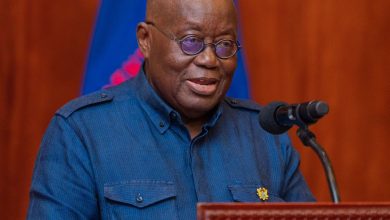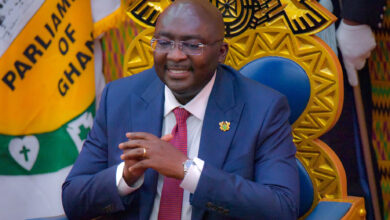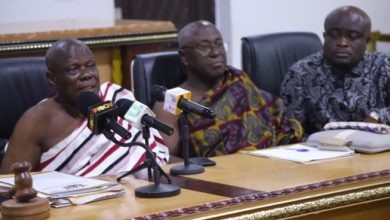Supreme Court dismisses “double salary case” filed by NPP Bono regional chairman

A seven-member Supreme Court panel has dismissed an application filed by Kwame Baffoe, aka Abronye DC, the Bono regional chairman of the New Patriotic Party, seeking an order of the court to compel a group of ministers in the former Mahama government, who were also MPs, to pay back to the state alleged double salaries they received while in office.
The Supreme Court panel, presided over by Justice Nene Amegatcher. reached this decision on Wednesday (9 November 2022), explaining that the applicant did not properly invoke the jurisdiction of the Supreme Court in his application.
The applicant invoked the original jurisdiction of the Supreme Court based on Articles 78 (3) and 98 (1) of the 1992 constitution, seeking interpretation of both.
Constitutional provision
Article 78 (1) states that “a Minister of State shall not hold any other office of profit or emolument whether private or public and whether directly or indirectly unless otherwise permitted by the Speaker acting on the recommendations of a committee of Parliament on the ground –
“(a) that holding that office will not prejudice the work of a Minister; and
“(b) that no conflict of interest arises or would arise as a result of the Minister holding that office.”
Article 98 (1), on the other hand, states that “a member of Parliament shall be paid such salary and allowances and provided with such facilities as may be determined in accordance with Article 71 of this constitution”.
Citing these provisions, the applicant sought interpretation from the Supreme Court on the alleged double salary paid to the former ministers, who were also serving members of Parliament.
AG opposes
However, the Attorney General opposed the application, noting that the two constitutional provisions invoked by the applicant did not raise any conflicts which required interpretation by the Supreme Court.
The provisions are straightforward, the AG said, and so his department prayed the court to dismiss the application.
By court
By unanimous decision, the seven-member Supreme Court panel ruled that it agreed with the AG’s argument that the constitutional provisions cited by the applicant did not require its interpretation. The court concluded that its jurisdiction had not been properly invoked.
“The writ has no merit whatsoever and it is therefore dismissed,” the panel ruled.
However, the court was of the view that there are avenues other than the Supreme Court that the applicant can explore to have his argument addressed.
The Supreme Court panel, apart from the presiding judge, was manned by Justices Nii Ashie Kotey, Mariama Owusu, Gertrude Torkornoo, Amadu Tanko, Henrietta Mensa-Bonsu and Yonny Kulendi.
Background
The double salary scandal was triggered by an audit of payroll data from the Office of the President as well as another review, of the Parliamentary Service Board, from 2012 through 2016.
The audit reports showed that certain former appointees doubling as MPs, who at various points also served as ministers or deputy ministers, received double salaries at least once a month or throughout the four-year tenure under review.
The CID in 2018 said the double salary saga “is contrary to Section 124 (1) of the Criminal and Other Offences Act 1960 (Act 29) as amended in 2012 (Act 849). Section 124 relates to the offence of stealing.”
The opposition National Democratic Congress (NDC) tried to play down the matter by claiming that it was a salary “top-up”, but investigations showed that most of the affected appointees were taking two separate pay slips from different organs of state (the executive and the legislature) at the same time, using different bank accounts.
The monthly pay slips were coming from the Parliamentary Service Board (PSB) and the Controller and Accountant General’s Department (CAGD), designated as the Office of the President.
Discussions with police
When the police launched investigations, most of the ex-ministers cited honoured the police invitation to explain issues to them.
For instance, Emmanuel Armah-Kofi Buah, the MP for Ellembelle who doubled as a former minister of energy and petroleum; Nii Laryea Afotey Agbo, the then MP for Kpone Katamanso, who was the Greater Accra regional minister as well as a former minister of state in charge of social and allied institutions; and Comfort Doyoe Cudjoe Ghansah, who is MP for Ada East, were interrogated by the CID.
Bashir Fuseini Alhassan, the MP for Sagnarigu and a former deputy Northern regional minister, was also at CID Headquarters to write a statement before he was admitted to bail. So was the second deputy Minority chief whip, Eric Opoku, who is the NDC MP for Asunafo South and a former Brong-Ahafo regional minister.
Inusah Fuseini, then the MP for Tamale Central and roads and highways minister; Fifi Fiavi Kwetey, a former transport minister and then the MP for Ketu South; Abdul Rashid Hassan Pelpuo, a former minister of state in the Office of the President and the MP for Wa Central; and Aquinas Tawiah Quansah, a former Central regional minister and former MP for Mfantseman West, were also asked questions by the police in connection with the alleged scandal.
Three others – Edwin Nii Lante Vanderpuye, the former youth and sports minister who doubles as the current MP for Odododiodoo, Alhassan Azong, a former minister of state in charge of public sector reform who is the former People’s National Convention MP for Builsa South, and Dr Dominic Akuritinga Ayine, who served as a deputy attorney general under President John Mahama and who is the current NDC MP for Bolgatanga East – were also at CID Headquarters to give their account of the case.
According to the list provided in 2018, the Minority Leader, Haruna Iddrisu, whose name reportedly popped up in the list as employee number 712534 and whose net salary was roughly GHC8,099.37, is not known to have visited the police to give a statement.
For Alhassan Azong, his employee number was 712536. He was purportedly taking a monthly net salary of roughly GHC8160.07, which was lodged in his account in Bolgatanga. Fifi Fiavi Kwetey (employee number 713809) was also receiving a monthly salary of GHC8,160.07 through his account at Kwame Nkrumah Circle, Accra.
Eric Opoku (employee number 713977) was the same, allegedly taking GHC8,160.07 monthly through his account with one of the troubled banks in Accra, while Abdul-Rashid Hassan Pelpuo was employee number 714107, on a reported net salary of roughly GHC8,160.07 lodged at a bank at Kwame Nkrumah Circle.
Emmanuel Armah Kofi Buah, with employee number 714197, was said to be receiving roughly GHC8,386.87 monthly, drawing the money through a distressed bank on the Spintex Road.
Edwin Nii Lantey Vanderpuye (employee number 725100) was allegedly receiving a monthly salary of approximately GHC7,594.49 into his bank at Ring Road Central, Accra, and Mark Owen Woyongo (employee number 71521), the former defence minister who reportedly detected the anomaly at one point and alerted the authorities, was taking roughly GHC8,861.25 every month, lodged in his bank account at Adabraka.
Comfort Doyoe Cudjoe Ghansah (employee number 920242) allegedly received roughly GHC8,160.07 through a bank in Dansoman and Aquinas Tawiah Quansah (employee number 830211) was said to be taking about GHC7,594.49 through his bank account on campus at the University of Cape Coast.
Professor Kwamena Ahwoi, a leading member of the NDC at the time, appealed to the president to take the alleged stealing case out of the hands of CID, arguing that the case was purely a matter involving an employer-employee relationship.





